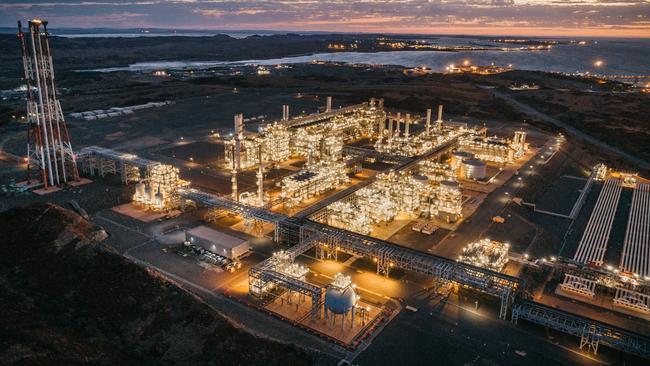Woodside Petroleum strikes deal with GIP for $7.6bn Pluto LNG expansion
Australia’s largest energy group has sold a 49 per cent stake in its $7.6bn Pluto LNG expansion plant in Western Australia to Global Infrastructure Partners.

Woodside Petroleum chief executive Meg O’Neill says activists calling for the end of fossil fuels are “grossly divorced from the reality of the world’s energy needs” after the company moved a step closer to developing Australia’s biggest gas project in a decade.
Just a day after the end of the Glasgow climate summit, New York-based fund Global Infrastructure Partners said it would take a 49 per cent stake in the West Australian Pluto LNG facility – valuing the project at $7.6bn.
The sale smooths the path for the giant Scarborough gas project to get the go-ahead by December.
Gas from the offshore field, west of Karratha, will be processed at the Pluto plant.
Environmental activists immediately promised to halt the project, which Greenpeace described as the most “climate-polluting project ever”.
But Ms O’Neill, who succeeded Peter Coleman in the top job this year, said new sources of gas were needed to meet demand from international buyers.
“We think the rhetoric associated with COP26 is grossly divorced from the reality of the world’s energy needs,” Ms O’Neill said. “When you look at the amount of energy the world needs to keep lights on, keep homes heated and cooled and keep food refrigerated, it’s tremendous.
“And when you ask yourself what’s the source of energy that’s safe, reliable, affordable and lower emissions intensity, LNG is an extremely attractive option.
“If you contrast it to other choices – renewables for example – you have the issue of intermittency.
“So yes, it’s great to have renewables, but they don’t work 24 hours a day. So we think gas is a very attractive energy source in a decarbonising world.”
With the world agreeing to phase out fossil fuel subsidies and phase down coal, gas producers remain confident in robust demand for several decades to come.
Australia’s climate modelling predicts coal exports will halve by 2050 but the gas industry would keep growing.
Ms O’Neill, who is working on a $40bn merger with BHP Petroleum, said LNG represented a cleaner fuel than coal for many major commodity buyers in Asia.
“I recognise that the language on coal represents a compromise between a number of different nation states, all of which are managing their own kind of social and economic pressures,” Ms O’Neill said. “But when I think about the places where we are largely selling our products – so those are the countries in North Asia – I think the fact that we’re offering a lower emissions-intensity fuel than coal is something that is attractive to many of our customers.”

Investors appeared supportive of the deal, with AllianceBernstein analyst Neil Beveridge describing it as a “reasonable outcome”.
“While we would have preferred a buyer to come in and less protection to GIP in the event of cost overrun (which is likely), the outcome will enable Woodside to focus capital on more high returning parts of the project,” he said.
Under the deal, GIP will fund $2.74bn for its share of the project and pay an extra $835m in construction costs, reducing Woodside’s contribution to $2.02bn.
Under the agreement, GIP will be compensated for additional direct emissions above an agreed limit and will be able to sell its stake back to Woodside if approvals become difficult.
The issue of LNG production has become increasingly fraught.
In October, Andrew Forrest’s Fortescue Future Industries defaced a Woodside advertisement as a battle exploded over the resources giant’s green credentials on the eve of the pivotal COP26 climate summit. Fortescue rewrote Woodside’s advertisement on Twitter by crossing out the company’s Better Future brand and inserting its own name and renewable hydrogen credentials as the better alternative.
Greenpeace also savaged the decision on Monday and vowed to fight the Scarborough project.
“It doesn’t matter which faceless investment giant Woodside teams up with. They’re still trying to build the most climate-polluting project ever in Australia, and we’re still going to stop them,” Greenpeace said in a statement.
Asked if Australia now needs to set a more ambitious 2030 emissions reduction target, Ms O’Neill said: “I think everybody’s got a role to play in terms of setting the pace of decarbonisation, and I fully recognise the government is looking at many different stakeholders’ needs.”
While Australia remains among the top LNG exporters in the world, it could exhaust all of its reserves by 2050 due to the lack of development of reserves, a report by consultancy EnergyQuest found on Monday.
Unless new oil and gas basins are explored and developed, “Australia runs the risk of going from hero to zero, with 10 empty LNG projects, in less than 30 years,” EnergyQuest said.
GIP has been in exclusive due diligence and pole position to buy the asset after Brookfield and CKI had earlier fallen away in the long-running competition. Woodside did not disclose the sale price.
The deal hands GIP a minority share of the onshore LNG plant, known as Pluto 2, which will be built to process gas from the offshore Scarborough field that is waiting to be sanctioned by Woodside and BHP.
The acquisition comes after GIP in December agreed to buy a 26.25 per cent ownership interest in the infrastructure of Shell’s Queensland LNG project for $US2.5bn ($3.4bn). It manages more than $US71bn in assets.
The company is poised to make further job cuts as part of an ongoing restructure and will broaden a cost savings target across the merged business should the BHP petroleum deal proceed.
A share sale agreement and integration contract for the tie-up is expected in November. The merger terms suggest the pair will make a final investment decision on Scarborough by December 15. BHP will sell its interest to Woodside if a tie-up fails. Woodside rose 1.1 per cent to $22.50.






To join the conversation, please log in. Don't have an account? Register
Join the conversation, you are commenting as Logout